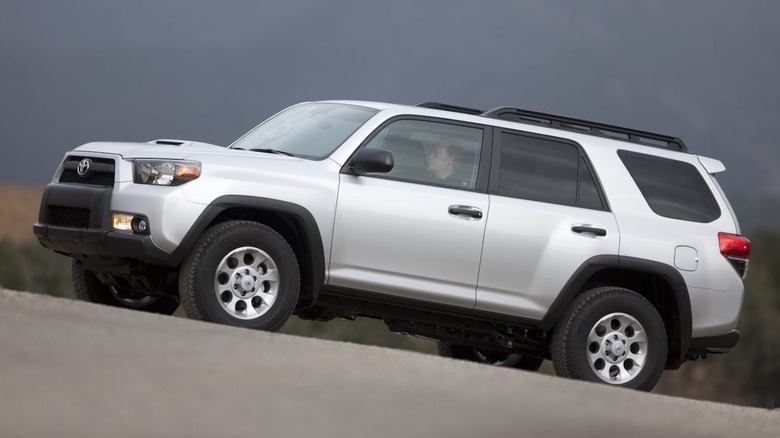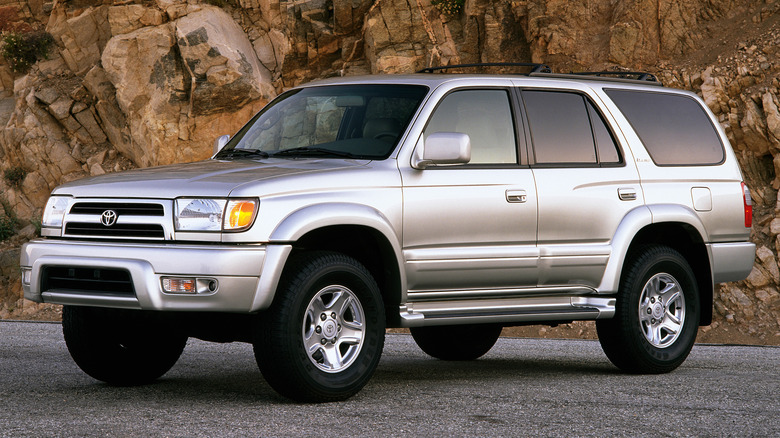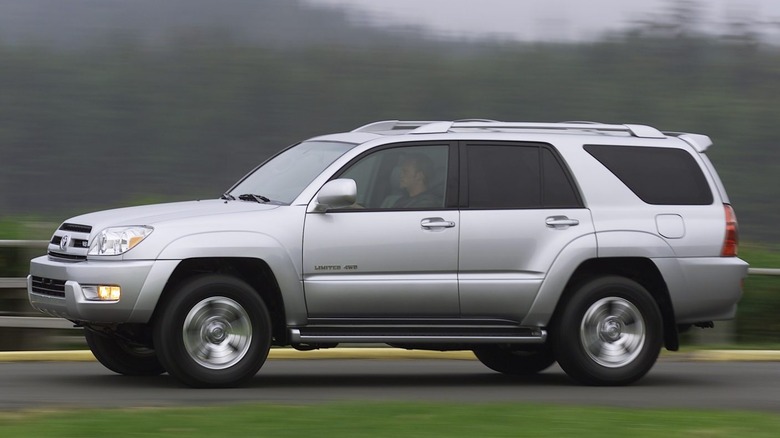Is A Used Toyota 4Runner A Good First Car? Here Are A Few Things To Consider
There's a lot to think about when you're buying your first car, or if you're helping someone else, like your kids, buy their first car. The cost to buy, cost to run (fuel economy), and safety are all part of the equation, but so are things like size and reliability. Thankfully, we know that the 4Runner is one of the most reliable SUVs ever made, so that base is covered, but how does the rugged Toyota SUV do in the other categories?
The 4Runner is a body-on-frame SUV that broadly shares its underpinnings with the Toyota Tacoma pickup truck, giving the 4Runner robust off-road capability and decent towing power. So, if those tasks are part of your regular driving routine, the 4Runner may be the right fit. The 4Runner is also relatively spacious, with seating for at least five passengers in most configurations, and up to seven passengers in certain trims. Depending on what you need for your first vehicle, three rows of seating might be a bit overzealous, but the cargo space could be useful for transporting large items.
Let's not forget about safety and cost, though — probably the most important considerations and the topics we're going to dive the deepest into. There are six generations of 4Runner, so the pricing and fuel economy spread is pretty wide over the years. Safety-wise, the newer models are safer and have more safety equipment (airbags weren't mandated in the U.S. until the 1990s), all of which you should consider in your search.
Toyota 4Runner pricing over the years
The cost of a used 4Runner, as with any used vehicle, will depend on factors like age, equipment, condition, and mileage. Even with those factors in play, however, there are a few ways to get a sense of things. Searching in your area for local listings will set a good bar, then you can turn to broader listing services. Classic.com is one source that gathers listings from multiple auction sites to find what it calls CMB (Classic.com Market Benchmark).
For first-generation (1984 – 1989) 4Runner models, the prices are pretty high at a little over $18,000. That's likely because these models are now classics and because cars listed on popular auction sites tend to be in more desirable condition. Second-generation (1990 – 1995) models drop significantly to an average of about $12,800, while third-generation 4Runners (1996 – 2002) move back upward with an average of about $15,000.
As we move further into the 2000s, prices continue to rise with each 4Runner generation. Fourth-generation models (2003 – 2009) have a CMB of about $16,300, which is generally affordable according to first-car standards, but the fifth generation (2010 – 2024) takes a big jump; it has a CMB of $29,300. According to Kelly Blue Book, the average used car buyer in May 2025 paid $25,470 for their vehicle, so the 4Runner is slightly above that when it comes to the latest fifth-generation models.
Safety ratings and fuel economy
NHTSA (National Highway Traffic Safety Administration) ratings are an excellent source for safety ratings dating back to the 1990s versions of the 4Runner. Early models had poor safety ratings. In the early-to-mid 1990s, for instance, the 4Runner received the lowest possible frontal crash-test rating of one star (out of five). Early 2000s models stepped their game up, and overall crash safety ratings climbed to four stars out of five for most 4Runners built after 2010.
On to MPG. Big, rough-and-tumble SUVs like the 4Runner aren't the first place you should look for impressive fuel economy. Even with modern hybrid models, the numbers aren't great. Depending on the year and the powertrain equipped to any particular 4Runner, the EPA's fuel-economy estimates range between 13 and 23 mpg combined. The 3.0-liter V6 engine that powered the 4Runner in the late 1980s and early 1990s is the worst offender, with most trims falling between 13 and 15 mpg. We recently drove the new 2025 4Runner, and it has a lot to offer — with its hybrid powertrains, it is your best bet for fuel economy, but it'll be tough to find one used because of how new it is.
Finally, it's worth noting that there are some common problems with various 4Runner models throughout the years, like rust, braking problems, and faulty airbags. Checking the specifics on your desired model year (like complaints registered with NHTSA) should help you avoid the dull spots in the 4Runner's history.


